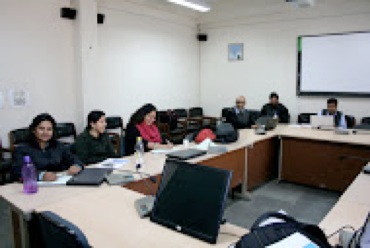
The Centre for the Study of Law and Governance offers an MPhil/PhD programme as well as a doctoral programme of study, which has generated enormous interest from prospective candidates, whether it is students who have just completed their Master’s degrees or employed professionals and officials. The Centre’s doctoral programme has a distinctive student profile, which includes members of the defence and civil services, lawyers, teachers and people working with civil society organisations.
The programmes of study offered by the Centre are as follows:
1. Doctoral Programme of Study
- Given its inter-disciplinary orientation, the Centre welcomes applications from scholars with M.Phil. degree in Political Science, Economics, Sociology, and Law. Those who do not have an M.Phil. degree should provide evidence of equivalent published work in the intended area of specialisation.
Eligibility for Admission:
Admission to the doctoral programme of study is made through a viva voce examination. Only those candidates are considered for admission to the Direct Ph. D. Programme as have
- obtained an M.Phil degree of a recognized University/Research Institution with minimum Final Grade Point Average (FGPA) of 6.00 in 10 point scale/comparable standard where the grading is based on system other than 10 point scale. The candidates who have obtained an M.Phil. degree from a University/Institution where the dissertation is not graded or grading is not on 10-point scale, are required to forward a copy of their M.Phil. dissertation along with the Application Form for the purpose of assessment of their credentials;
OR
- at least 2 years research/administrative/legal experience in reputed institutions with research publication(s) comparable to M.Phil. standard. In addition, they should have obtained Master’s Degree with FGPA of 6.00 in the 10 point scale/comparable standard or equivalent percentage.
2. MPhil/ PhD Programme in Law and Governance

The distinctive features of the M.Phil. Programme are its multidisciplinary orientation in both course design and teaching plan; its substantive academic content; its distinctiveness when compared to available courses in other Indian Universities; and its coherence as a programme of study with a policy orientation.
The objectives of the M.Phil./Ph.D. Programme in Law and Governance include the following:
- To prepare candidates for doctoral research in public policy and socio-legal research that is not limited by uni-disciplinary training.
- To equip students with the skills necessary to undertake research in areas of public policy, including a special focus on the legal implications of these issues, by developing their expertise in these diverse disciplinary areas, and so to enable a more complex and multifaceted approach to issues of governance, public policy and law.
- To acquaint the qualified practitioner – policy-maker, civil servant, lawyer or civil society professional – with the major issues in this area.
The M.Phil. programme is a two-year (four-semester) programme of study from which students may move on to the doctoral programme provided they meet the minimum grade requirements laid down by the University. The M.Phil. programme consists of 3 compulsory courses; 3 optional courses; and a dissertation. Each course carries 3 credits, and the course requirements are to be completed in the first two semesters of the programme. The dissertation carries 10 credits and is to be completed by the end of the fourth semester. While the three core compulsory courses provide a general overview of the issues and debates in the area of law and governance, the optional courses provide the students with the opportunity to develop a specialization, and so build up an expertise that can be further channelized in the dissertation work. Admission to the M.Phil./PhD Programme is by an entrance examination conducted by the University, followed by a viva voce for those candidates who qualify in the written examination. The eligibility conditions for taking the examination are a Master’s degree in Political Science, Public Administration, Economics, Sociology, History, Philosophy or Law with 55% marks; or 60% in any branch of natural science. The written test has essay type questions from the fields of Political Science, Public Administration, Sociology, Economics, and Law. The test will evaluate the candidate’s analytical abilities and competence in her/his discipline. The areas covered by the test will relate to issues such as the following: the changing role of the state; the relationship between the state, market and civil society; civil service reform and the new public management; regulatory regimes; local governance, both rural and urban; the rule of law and access to justice; the social and economic bases of law; and global governance.